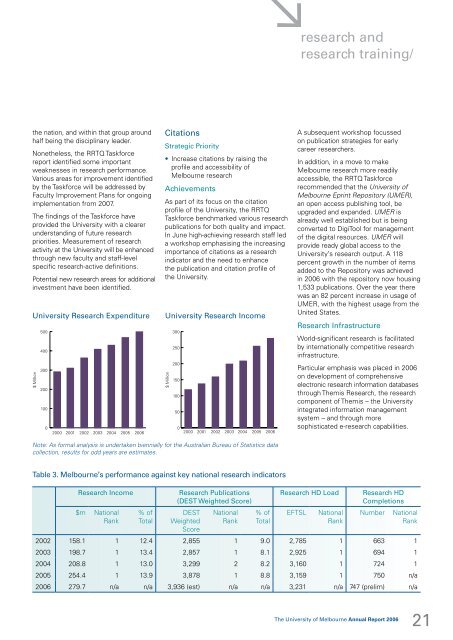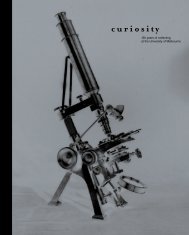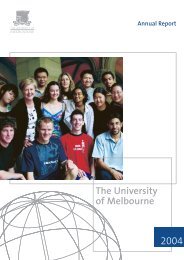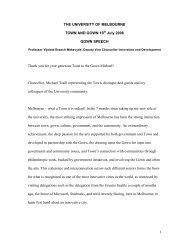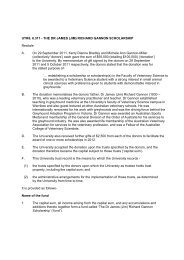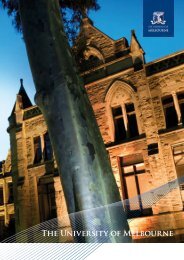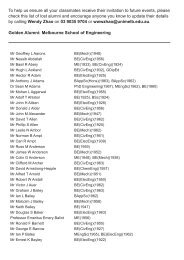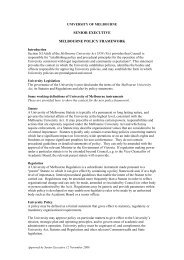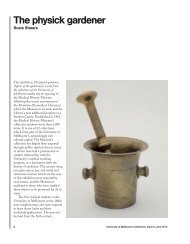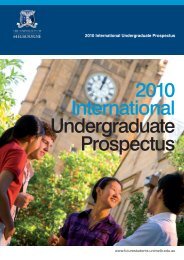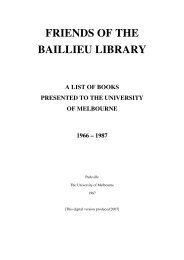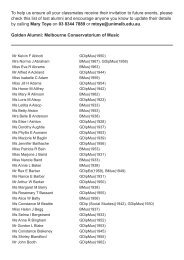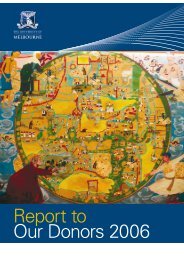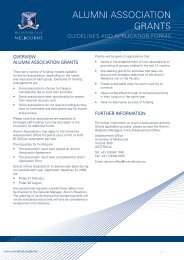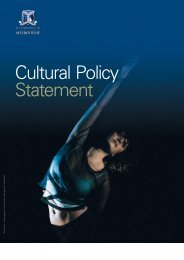annual report/2006 - University of Melbourne
annual report/2006 - University of Melbourne
annual report/2006 - University of Melbourne
Create successful ePaper yourself
Turn your PDF publications into a flip-book with our unique Google optimized e-Paper software.
esearch and<br />
research training/<br />
the nation, and within that group around<br />
half being the disciplinary leader.<br />
Nonetheless, the RRTQ Taskforce<br />
<strong>report</strong> identified some important<br />
weaknesses in research performance.<br />
Various areas for improvement identified<br />
by the Taskforce will be addressed by<br />
Faculty Improvement Plans for ongoing<br />
implementation from 2007.<br />
The findings <strong>of</strong> the Taskforce have<br />
provided the <strong>University</strong> with a clearer<br />
understanding <strong>of</strong> future research<br />
priorities. Measurement <strong>of</strong> research<br />
activity at the <strong>University</strong> will be enhanced<br />
through new faculty and staff-level<br />
specific research-active definitions.<br />
Potential new research areas for additional<br />
investment have been identified.<br />
<strong>University</strong> Research Expenditure<br />
$ Million<br />
500<br />
400<br />
300<br />
200<br />
100<br />
0<br />
2000 2001 2002 2003 2004 2005 <strong>2006</strong><br />
Citations<br />
Strategic Priority<br />
• Increase citations by raising the<br />
pr<strong>of</strong>ile and accessibility <strong>of</strong><br />
<strong>Melbourne</strong> research<br />
Achievements<br />
As part <strong>of</strong> its focus on the citation<br />
pr<strong>of</strong>ile <strong>of</strong> the <strong>University</strong>, the RRTQ<br />
Taskforce benchmarked various research<br />
publications for both quality and impact.<br />
In June high-achieving research staff led<br />
a workshop emphasising the increasing<br />
importance <strong>of</strong> citations as a research<br />
indicator and the need to enhance<br />
the publication and citation pr<strong>of</strong>ile <strong>of</strong><br />
the <strong>University</strong>.<br />
<strong>University</strong> Research Income<br />
$ Million<br />
300<br />
250<br />
200<br />
150<br />
100<br />
50<br />
0<br />
2000 2001 2002 2003 2004 2005 <strong>2006</strong><br />
A subsequent workshop focussed<br />
on publication strategies for early<br />
career researchers.<br />
In addition, in a move to make<br />
<strong>Melbourne</strong> research more readily<br />
accessible, the RRTQ Taskforce<br />
recommended that the <strong>University</strong> <strong>of</strong><br />
<strong>Melbourne</strong> Eprint Repository (UMER),<br />
an open access publishing tool, be<br />
upgraded and expanded. UMER is<br />
already well established but is being<br />
converted to DigiTool for management<br />
<strong>of</strong> the digital resources. UMER will<br />
provide ready global access to the<br />
<strong>University</strong>’s research output. A 118<br />
percent growth in the number <strong>of</strong> items<br />
added to the Repository was achieved<br />
in <strong>2006</strong> with the repository now housing<br />
1,533 publications. Over the year there<br />
was an 82 percent increase in usage <strong>of</strong><br />
UMER, with the highest usage from the<br />
United States.<br />
Research Infrastructure<br />
World-significant research is facilitated<br />
by internationally competitive research<br />
infrastructure.<br />
Particular emphasis was placed in <strong>2006</strong><br />
on development <strong>of</strong> comprehensive<br />
electronic research information databases<br />
through Themis Research, the research<br />
component <strong>of</strong> Themis – the <strong>University</strong><br />
integrated information management<br />
system – and through more<br />
sophisticated e-research capabilities.<br />
Note: As formal analysis is undertaken biennially for the Australian Bureau <strong>of</strong> Statistics data<br />
collection, results for odd years are estimates.<br />
Table 3. <strong>Melbourne</strong>’s performance against key national research indicators<br />
Research Income<br />
$m National<br />
Rank<br />
% <strong>of</strong><br />
Total<br />
Research Publications<br />
(DEST Weighted Score)<br />
DEST<br />
Weighted<br />
Score<br />
National<br />
Rank<br />
% <strong>of</strong><br />
Total<br />
Research HD Load<br />
EFTSL<br />
National<br />
Rank<br />
Research HD<br />
Completions<br />
Number<br />
National<br />
Rank<br />
2002 158.1 1 12.4 2,855 1 9.0 2,785 1 663 1<br />
2003 198.7 1 13.4 2,857 1 8.1 2,925 1 694 1<br />
2004 208.8 1 13.0 3,299 2 8.2 3,160 1 724 1<br />
2005 254.4 1 13.9 3,878 1 8.8 3,159 1 750 n/a<br />
<strong>2006</strong> 279.7 n/a n/a 3,936 (est) n/a n/a 3,231 n/a 747 (prelim) n/a<br />
The <strong>University</strong> <strong>of</strong> <strong>Melbourne</strong> Annual Report <strong>2006</strong><br />
21


